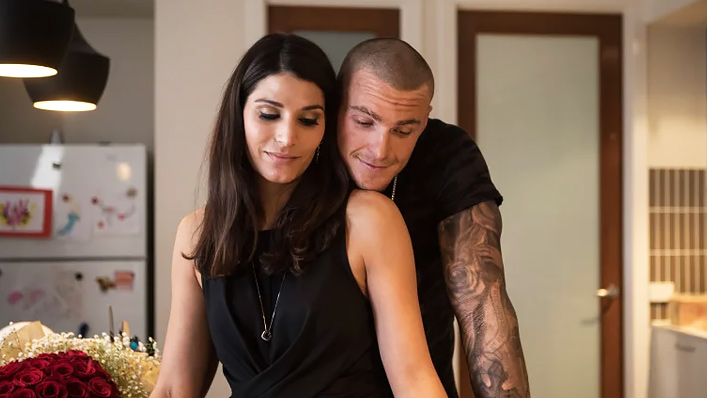Australian Gangster is a frantically entertaining if trashy Aussie crime series

Pasquale Barbaro is the latest Aussie criminal to be the subject of a debaucherous TV series—this one co-directed by Two Hands‘ Gregor Jordan. Intellectual it ain’t—but nor is it totally daft, says Luke Buckmaster.
Audiences are drawn to shows like Australian Gangster for the same reason they’re compelled by footage of wild animals tearing each other apart in nature documentaries—as a kind of ghastly anthropological observation. This two-part television mini-series, written by Gregor Jordan (who helmed the Australian classic Two Hands) and co-directed by Jordan and Fadia Abboud, is one of those productions you watch through the gaps in your fingers, thanks to an eerily convincing performance from Alexander Bertrand as the late Sydney gangster Pasquale Barbaro.
See also
* The 25 best Australian movies on Netflix
* All new streaming movies & series
Built like a brick shithouse—as the old Australian colloquialism goes—Bertrand delivers a rough-as-guts performance so good, so primordially authentic, so convincingly full of angry guff you have difficulty believing he is not in some way a part of this world himself. If this frantically entertaining production were of a higher pedigree, his performance would be more obviously haunting and dramatic, perhaps even with flickers of greatness reminiscent of some of the finest portrayals of Australian criminals and ex-cons—such as Daniel P. Jones in Hail, Richard Green in Boxing Day and Eric Bana in Chopper.
Instead, Bertrand finds himself battling against the wild pace and tempo of the show itself, which is choppy and coarse, edited in that paranoid television style that seems to scream ‘we’re petrified you might change the channel at any time’. Australian Gangster plonks Bertrand smack-bang in the centre of the show but doesn’t quite trust him to carry it. Part of the brief was clearly to capture, in both character and style, a contemporary form of ostentatious criminal culture—focused on a thug who lives the high life, hoons around in a Lamborghini, poses for Instagram selfies, and seems biologically incapable of even entertaining the idea of keeping a low profile.
Early moments in the second episode (both are available to stream on 7Plus) include a scene on a luxury yacht, in Sydney Harbour, resembling an Australian spin on The Wolf of Wall Street. But Barbaro doesn’t have the brains of Jordan Belfort; only a desire to live outside the law. Jordan’s scrambled narrative follows a classic rise and fall trajectory: the upcoming crim, then bona fide crim, then crim with a contract on his head. The protagonist climbs the ladder of the Sydney underworld, forming a posse while navigating occupational hazards such as trying not to be killed by a Lebanese gangster known as Little Crazy (Rahel Romahn).

The script makes an interesting and explicit connection between real estate and criminals: a very, dare I say it, Sydney approach, with many real-life reference points illustrating its truthfulness—from the documentary Exposed: The Ghost Train Fire to feature films such as Heatwave and The Killing of Angel Street, both inspired by the disappearance of Australian activist Juanita Nielsen whose campaign against property development cost her her life. Barbaro figures, not unreasonably, that there’s more money to be made in cranes, concrete, land titles and the like than garden variety gangsterism, so he muscles into that space—not to replace drug-dealing but in addition to it.
The man himself is very much on the gear, snorting enough marching powder to keep him dancing till Christmas (editor Adam Wills tries to simulate this mindset aesthetically, whipping scenes together with a wild pace). We don’t see much of the ins and outs of Barbaro’s operation, possibly due to the freshness of the events depicted (Barbaro was murdered in 2016) and legal concerns therein. Jordan recently told The Age that “we left stuff out, out of fear of litigation,” which “was a fascinating process that involved a lot of discussion with lawyers.”
Fascinating for him, perhaps; less so for the audience. Instead of the business end there’s lots of the ‘hardened criminal balancing domestic life’, with Barbaro oscillating from walking on the wild side to spending time with his kids and wife. This tension was explored slyly in Nash Edgerton’s recent, terrific black comedy series Mr. Inbetween—though that’s a high yardstick. Australian Gangster is trashier, snappier and pulpier; it’s more bling-filled but also more forgettable. It’s not badly made, though. And—unlike the airheads at the heart of its universe—it isn’t daft. At its core is Bertrand’s intense, eerily good performance. Like a wild animal, you want to watch him but you don’t want to meet him.

















